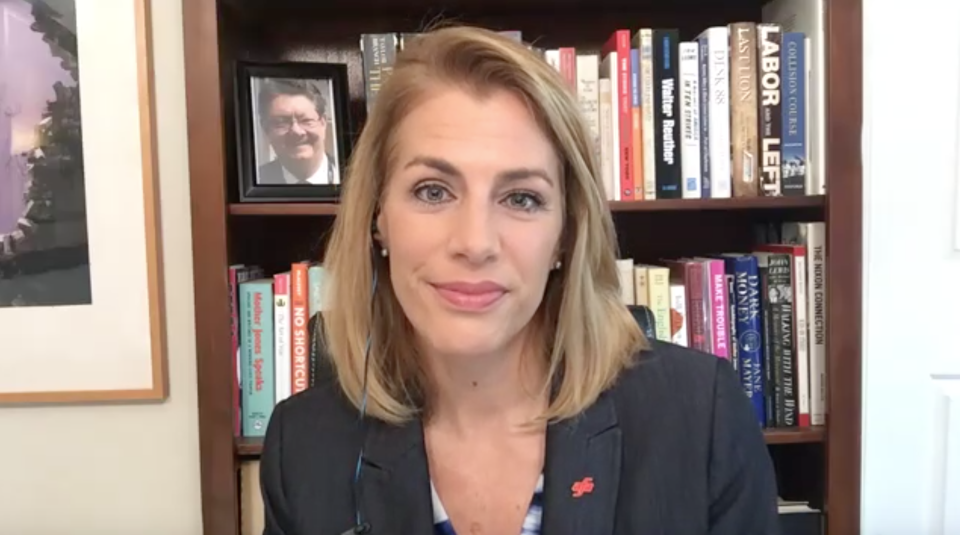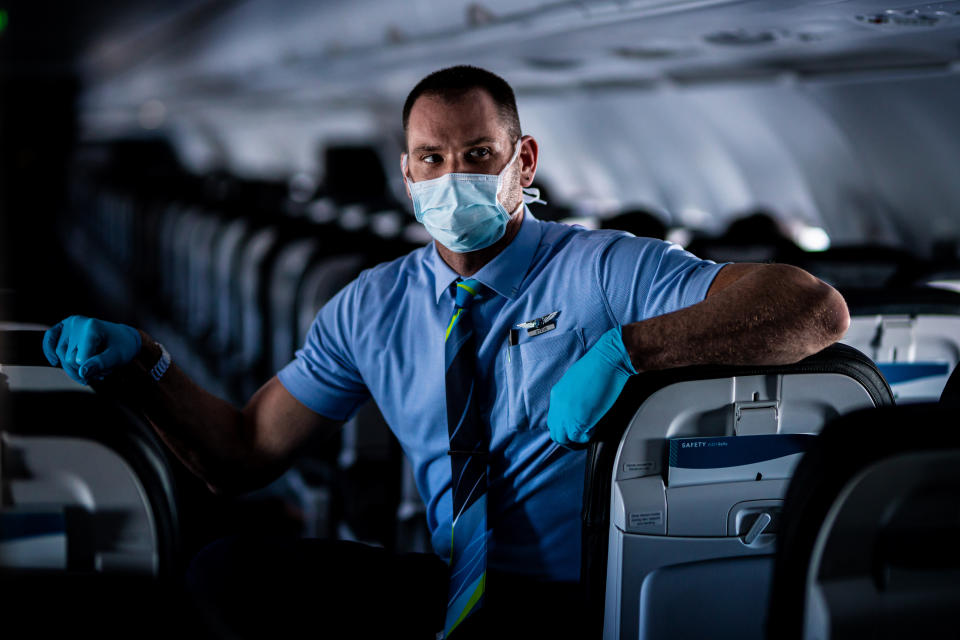Flight attendants see a very different future for airplane travel in the age of coronavirus
“Recognize that there are going to be social distancing practices at the airport. So there’s no running to the gate at the last minute,” said Sara Nelson, the international president of the Association of Flight Attendants-CWA in an interview with Yahoo News.
From her remote location for this interview, Nelson sat with a photo behind her. “Over my shoulder is a picture of Paul Frishkorn. He was a longtime flight attendant and he was the first one to be taken from us with coronavirus,” she said through tear-filled eyes.

JetBlue was the first airline to make masks a must for travelers taking flights during the COVID-19 pandemic just last week, and now others are joining. “We need to have everyone wearing masks and now, even though the government didn’t mandate that, our airlines did step up and require that all passengers are now required to wear masks in the airport and on planes,” said Nelson. “They’re going to have to wear one to get through the whole check-in process.”
Flight attendants are living in a world of uncertainty at the moment, and Molly Choma, an attendant based in San Francisco and a photographer, has been capturing her experience working through this pandemic as an essential employee. “Being a flight attendant has changed a lot in the last two months. At first during the pandemic, we didn’t really know how this was going to end. We didn’t know, were they going to stop all flights? Were they going to stop some flights?” said Choma.

And her concerns are valid. There have been recent reports of flights getting canceled and suspended until the fall, which means a loss of not only business, but also jobs. “Everything has changed so much with coronavirus. We went from completely full airplanes and airlines celebrating profits just in February and talking about hiring over 100,000 people this year alone, to the point where the airlines really would have collapsed because it was down to just 3 percent demand for air travel in March,” said Nelson.
While nearly 95 percent of Americans faced stay-at-home orders from their state governments in the past month, the federal government seemed to miss the mark on requiring comparable safety measures for airline passengers. But now that is changing. With states beginning to reopen, there has been a slight spike in air travel, but flying is not exactly how it used to be.
“Flying right now is a really different experience, but what we’re trying to do is use this time to get these safety precautions in place so hopefully by the end of summer and fall we can actually get to some kind of normalcy,” said Nelson. Right now on flights, in addition to masks, attendants are attempting to space out passengers to uphold social distancing regulations; food and beverage service has been nearly completely suspended; and travelers are advised to bring their own sanitizing wipes and hand sanitizer. “It’s really important that travelers are arming themselves with the facts before they go,” said Nelson.
Being prepared for a different flight experience in the future is going to be crucial for the time being. “If someone asks you to put on a mask, you should just do it,” said Choma. “I want to remind people that air travel is a place where people are used to doing things they don’t do in any other places,” added Nelson.
Staying positive is what Choma is focusing on. As the daughter of a flight attendant, she has been looking to her mother for inspiration through this difficult time. “I feel like this is scary, but there’s a lot of other scary things too, and you just kind of have to keep going, and ... so the only way to keep going is to just take things one day at a time,” she said.

And with everything in the world changing so quickly every day, there really is no other approach. While some experts predict that flying in the future could require travelers to submit blood test results, Nelson said that new regulations of any kind take a lot of time. In the meantime, she will work on getting regulations underway that will protect flight attendants and travelers as soon as possible.
On April 23, Nelson wrote to Transportation Secretary Elaine Chao and Health and Human Services Secretary Alex Azar: “Since flight attendant ability to practice social distancing is challenging in the aircraft cabin and on most other forms of public transportation, it is essential that we wear masks as often as possible so long as COVID-19 remains a threat to public health. In addition, passengers on all modes of public transport should be encouraged to wear masks in the short term and mandated by emergency regulation as soon as practicable.”
“The reason that we are all wearing masks is that we don’t have the virus contained and we don’t have a vaccine that’s readily available for everyone. So I think [we] can expect that masks will be here until we have a vaccine readily available. But then once we have this virus fully under control and really eradicated as a threat, I expect that this is something that will go away and we will go back to smiling at each other and buying lipstick again,” Nelson said.
_____
Click here for the latest coronavirus news and updates. According to experts, people over 60 and those who are immunocompromised continue to be the most at risk. If you have questions, please refer to the CDC’s and WHO’s resource guides.
Read more:


